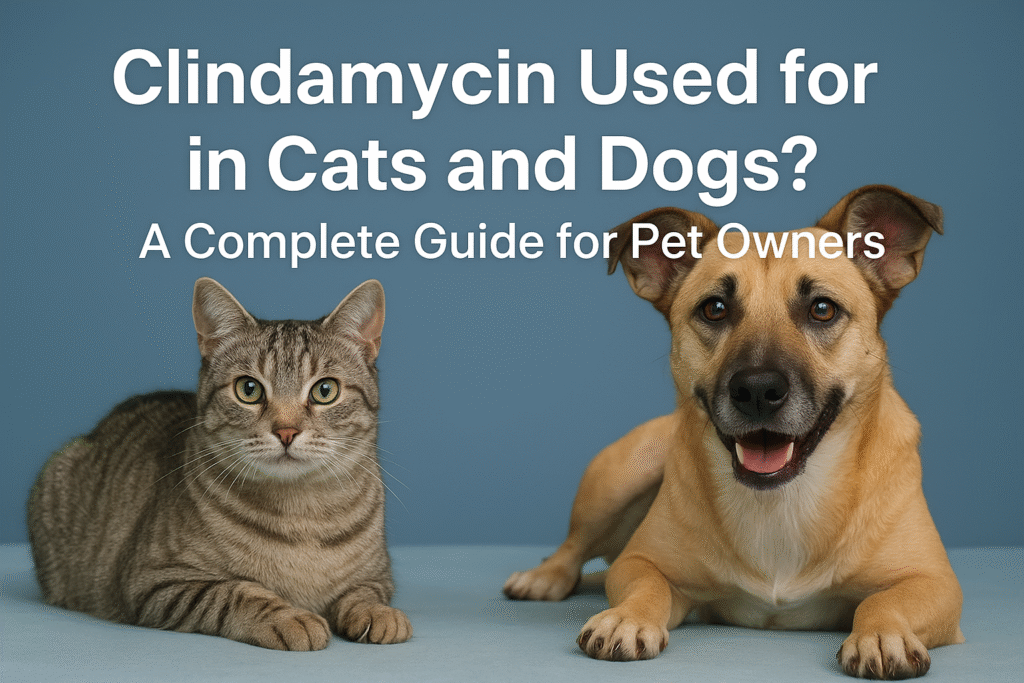What is Clindamycin?
Clindamycin is type of antibiotic that is related to the lincosamide class of medications process. It works by inhibiting bacterial protein synthesis, that prevents bacteria from growing and spreading in the cats and dog body. Unlike or bads broad spectrum antibiotics that target a big range of bacteria, Clindamycin is especially effective against anaerobic bacteria and certain protozoal organisms in pet sensitive body.
In different medicine, it is commonly prescribed in oral capsule, liquid suspension, or injectable form in vet health purpose.

What is Clindamycin Used for in Cats and Dogs?
Clindamycin can be use in multiple way in both cats and dogs. Some of the most common include:
-
Dental Infections
- Tooth, the primary reasons Clindamycin is prescribed is to treat oral and dental infections like gums.
- And as particularly effective against bacteria found in the gums, teeth roots, and oral tissues of animal.
- There are many prescribe it before or after dental cleanings, tooth extractions, or gum disease treatment pets.
-
Skin and Soft Tissue Infections
- Clindamycin is very used to treat wound infections, abscesses, bite wounds, and post-surgical infections in cats and dogs type pets.
-
Bone Infections (Osteomyelitis)
- Bone is strength but because of its ability to penetrate bone tissue, Clindamycin is sometimes prescribed for bone infections, which can be difficult to treat with other antibiotics for health.
-
Respiratory Tract Infections
- Both pets, Clindamycin can help fight lung and sinus infections caused by susceptible bacteria in their body.
-
Protozoal Infections (Toxoplasmosis in Cats)
- The most important uses of Clindamycin in cats is the treatment of toxoplasmosis, a parasitic disease caused by Toxoplasma gondii in pets.
- Pets are prescribe it when cats show clinical signs of this infection in body.
How is Clindamycin Given to Pets?
- Oral Tablets/Capsules: we can give it directly or hidden in food/treats or water.
- Liquid Suspension: it could be easier to give to cats, but the taste can be bitter in cat.
- Injection: Used in clinics for fast acting treatment on your loving pet member.
We need to know dosage depends on your pet’s weight, condition, and the severity of the infection. It is crucial to follow your veterinarian’s instructions and advoice carefully and never adjust the dose yourself if you do they should be die.
Side Effects of Clindamycin in Cats and Dogs
Like all medications, Clindamycin may cause side effects. Most of the pets tolerate it well, but in possible case or reactions include:
- Nausea\Vomiting
- Diarrhea or soft stools
- Loss of appetite
- Drooling (cats due to bitter taste)
(Rare) Severe side effects:
- Allergatic cases (like vomiting, itching, swelling, difficulty breathing).
- Severe dehydration or a bloody diarrhea or others.
If you see any type of concerning symptoms, contact your veterinarian immediately and hurry.
Important Tips for Pet Owners
- Complete the full course: if you see your pet seems better, don’t stop treatment early.
- Give with food or water: it helps to reduce stomach upset.
- Monitor your pet: must watch for side effects, and inform your vet if anything unusual happens in pet behave.
- Store properly: Keep at him/her room temperature and away from direct sunlight rays.
FAQs
1. What is Clindamycin used for in cats and dogs?
Clindamycin is a veterinary antibiotic used to treat dental infections, skin and wound infections, bone infections, respiratory infections, and toxoplasmosis in cats.
2. Is Clindamycin safe for cats and dogs?
- Yes, Clindamycin is considered safe when prescribed by a veterinarian.
- However, pets with liver or kidney issues or those that are pregnant or nursing should use it with caution.
3. How do I give Clindamycin to my pet?
- It can be given as a capsule, liquid suspension, or injection.
- The oral suspension may taste bitter, so many owners hide the capsule in food or treats for easier administration.
4. What is the Clindamycin dosage for cats and dogs?
The dosage depends on your pet’s weight, health condition, and severity of the infection. Always follow your vet’s instructions and never adjust the dose on your own.
5. What infections does Clindamycin treat in cats?
In cats, Clindamycin is commonly prescribed for dental disease, gum infections, wound abscesses, respiratory infections, and toxoplasmosis.
Conclusion
- Clindamycin is a valuable antibiotic in veterinary medicine, highly and mostly used to treat infections in both pets.
- Dental diseases and skin infections to toxoplasmosis in cats, this medication plays an important role in keeping pets healthy.
- Should always be used under veterinary guidance, with the correct and good dosage and monitoring under the pets.
- If your vet prescribes Clindamycin, you can feel reassured that it’s a trusted, effective treatment option just make sure to follow their instructions closely.

